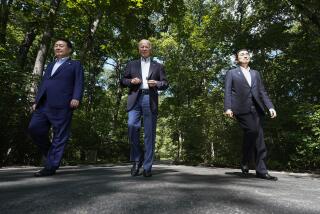U.S. Eases Threat of Sanctions Over N. Korea A-Plants
- Share via
SEATTLE — Secretary of State Warren Christopher, in a conciliatory move keyed to the opening of foreign ministers’ meetings at the Pacific Rim summit, said Wednesday that the United States is committed to a “diplomatic solution” to the North Korean nuclear standoff and is not yet ready to seek international economic sanctions against the Pyongyang regime.
Christopher’s statement means the Administration is putting off for at least a few weeks more any attempt to seek tough U.N. Security Council action against North Korea if it fails to open its nuclear facilities to international inspection.
Some critics have complained that the United States is permitting North Korea to use negotiations as a delaying tactic. Japan and South Korea have generally favored a go-slower approach to seeking sanctions, though their governments are divided on the issue.
Christopher, making clear that his remarks were aimed in part at North Korean President Kim Il Sung, declared, “We urge North Korea to join the community of responsible nations by responding to the comments that I have made here today.”
Over the past few weeks, North Korea has refused to meet deadlines for allowing inspections of its nuclear plants, which intelligence agencies suspect are being used to reprocess plutonium for weapons, and the Clinton Administration held a top-level meeting Monday to try to work out what to do next.
On Wednesday, while Christopher signaled further delay, he also warned that if the Clinton Administration does go to the Security Council, it believes it will get support from China, North Korea’s longtime ally.
“We are in close touch with China on North Korea,” he said in a speech at the University of Washington. He noted that China has so far not been willing to use its veto power to block any U.N. resolutions on North Korea.
There were indications Wednesday that Seoul has qualms about Washington’s new effort to reach a diplomatic agreement with North Korea.
A senior South Korean official, who asked not to be identified, said President Kim Young Sam will urge President Clinton to stick to earlier demands that North Korea accept a series of conditions before embarking on a new round of diplomatic negotiations between Washington and Pyongyang.
Both the United States and the International Atomic Energy Agency have tried to induce North Korea to take several steps on inspections of its nuclear plants.
The first is to permit the IAEA to change the film, batteries and other equipment in the monitoring devices the agency maintains at the North Korean nuclear plant at Yongbyon. The second is to let IAEA inspectors visit the plant for routine monitoring.
The third step is to have special inspections of two sites where North Korea is suspected of having dumped nuclear wastes.
Meanwhile, the Asia-Pacific Economic Cooperation meetings, which opened here earlier in the week with trade and other discussions by lower-level officials, began to focus more directly on how the Pacific Rim nations will relate to one another now that economic concerns, rather than security, have become dominant.
And for all the talk of common interests and the benefits of free trade, it was clear that the 15 countries participating in the historic Seattle meeting have vastly differing interests.
Han Sung Joo, South Korea’s foreign minister, said in an interview that the Seattle conference is significant in “bringing the West Pacific and America together under one roof.”
In view of the “general impulse of the United States to withdraw (militarily) from Europe and Asia,” he said the conference shows that the Clinton Administration has determined that involvement in the Asia-Pacific economy, as well as the region’s security, is in U.S. interests.
“We are gratified” by that decision, Han said.
Han also expressed pleasure that Clinton had shifted his approach to Beijing away from a harsh condemnation of the human rights situation in China, an approach he said was “not the best way.” The foreign minister also said South Korea supports Clinton’s proposal to work toward transforming APEC into a free trade area.
* VISIT TO L.A.: South Korean leader visits Los Angeles on way to summit. B3
More to Read
Sign up for Essential California
The most important California stories and recommendations in your inbox every morning.
You may occasionally receive promotional content from the Los Angeles Times.










